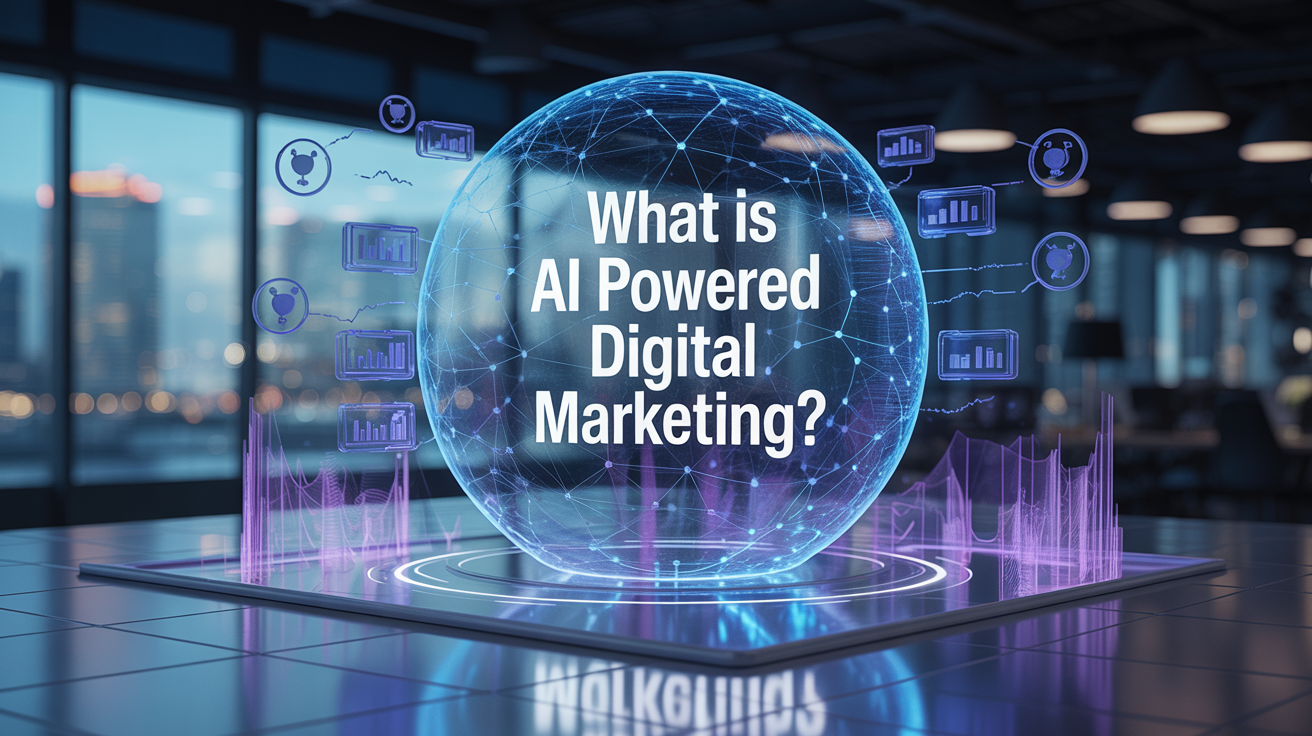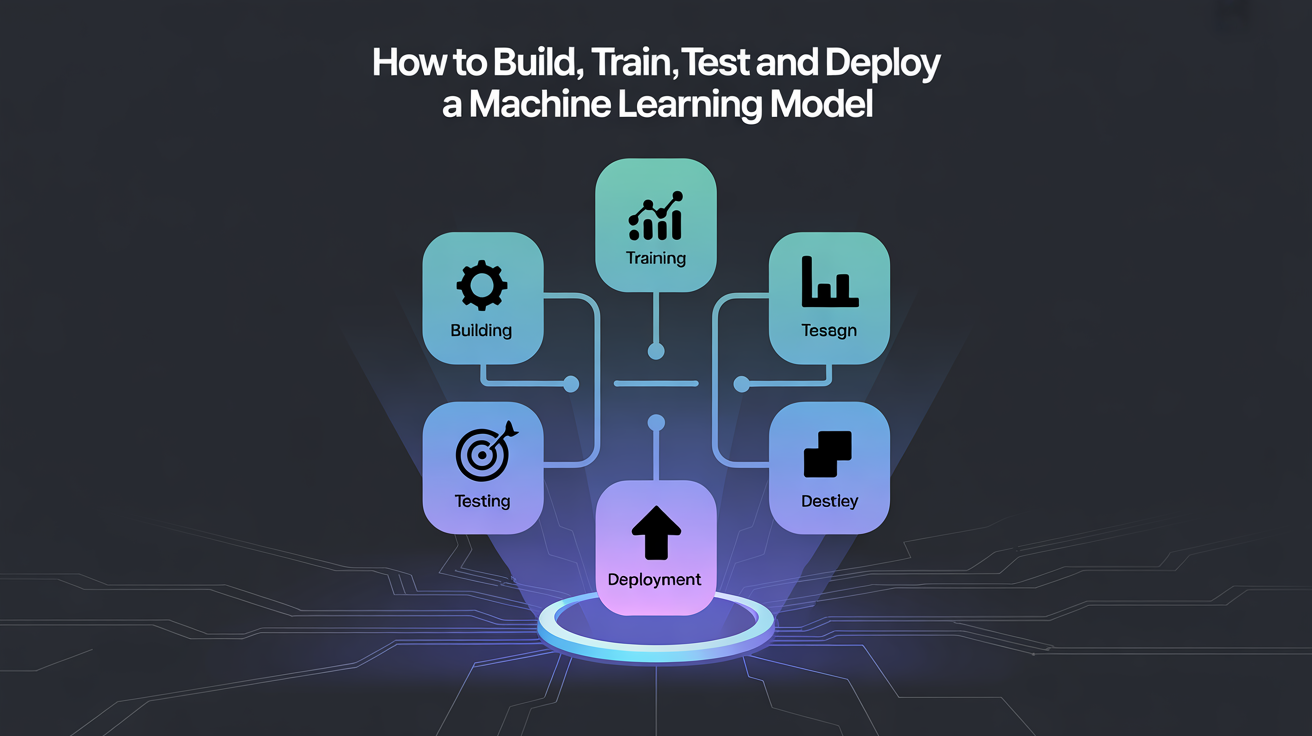To stay ahead in today’s fast-paced digital world, we must use cutting-edge technology. One of the most transformative advancements in recent years is AI-powered digital marketing. By integrating artificial intelligence (AI) into marketing strategies, brands can enhance personalization, optimize campaigns, and drive better results.
But what exactly is AI-powered digital marketing, and how does it work? In this article, we’ll explore these topics:
- What is AI-Powered Digital Marketing?
- How AI is Transforming Digital Marketing
- Key Applications of AI in Digital Marketing
- Benefits of AI in Marketing
- Challenges and Ethical Considerations
- Real-World Examples of AI in Marketing
- The Future of AI in Digital Marketing
Let’s dive in!
1. What is AI-Powered Digital Marketing?
AI-powered digital marketing refers to the use of artificial intelligence technologies, such as Machine learning (ML), Natural language processing (NLP), and Predictive analytics, to automate, optimize, and enhance marketing efforts. AI helps marketers analyze large amounts of data, predict customer behavior, and deliver hyper-personalized experiences at scale.
Unlike traditional marketing, where decisions are often based on intuition, AI-driven marketing relies on data-driven insights, ensuring higher accuracy and efficiency.
Why is AI Important in Digital Marketing?
AI is revolutionizing digital marketing by making campaigns smarter, faster, and more effective. Here’s why it matters:
- Better customer targeting – AI analyzes massive amounts of data to find your ideal customers and predict what they want to buy
- Saves time and money – Automates repetitive tasks like email scheduling, ad bidding, and social media posts so your team can focus on bigger picture stuff
- Personalized experiences – Creates custom content and recommendations for each visitor, making them feel like you’re speaking directly to them
- Real-time improvements – Constantly tweaks your campaigns while they’re running to get better results without you having to babysit them
- Smarter spending – Figures out which marketing channels actually work and shifts your budget to what’s bringing in customers
- 24/7 customer support – Chatbots handle basic questions anytime, keeping potential customers engaged even when your team is offline
- Predictive insights – Tells you what trends are coming and which customers are about to buy, so you can stay ahead of competitors
2. How AI is Transforming Digital Marketing
AI is revolutionizing digital marketing in several ways:
A. Enhanced Customer Insights
AI-powered tools like Google Analytics 4 (GA4) and IBM Watson analyze customer behavior, demographics, and engagement patterns. This helps businesses understand their audience better and create targeted campaigns.
B. Predictive Analytics
AI predicts future trends by analyzing historical data. For example:
- Netflix uses AI to recommend shows based on viewing history.
- Amazon suggests products using predictive algorithms.
C. Chatbots & Virtual Assistants
AI-driven chatbots (like ChatGPT or Drift) provide instant customer support, improving engagement and reducing response times.
D. Programmatic Advertising
AI automates ad buying, ensuring ads are shown to the right audience at the right time. Platforms like Google Ads and Facebook Ads use AI to optimize bids and placements.
E. Content Generation & Optimization
AI tools like Jasper.ai and Copy.ai help create SEO-friendly content, while Grammarly enhances readability.
3. Key Applications of AI in Digital Marketing
A. Personalized Marketing Campaigns
AI segments audiences based on behavior, enabling personalized email marketing, product recommendations, and dynamic website content.
Example: Spotify’s “Discover Weekly” playlist is generated using AI to match users’ music tastes.
B. SEO & Content Marketing
AI tools like SurferSEO and Clearscope analyze top-ranking content and suggest optimizations for better search rankings.
C. Social Media Marketing
AI helps in:
- Sentiment Analysis: Understanding audience emotions (e.g., Brandwatch).
- Automated Posting: Tools like Hootsuite AI schedule posts for optimal engagement.
D. Email Marketing Automation
AI-driven platforms like Mailchimp and HubSpot optimize send times, subject lines, and content for higher open rates.
E. Voice Search Optimization
With the rise of Alexa and Google Assistant, AI helps optimize content for voice search queries.
4. Benefits of AI in Digital Marketing
Now we will see what are the benefits of AI in digital marketing.
AI is delivering real, measurable improvements that are changing the game for marketers everywhere. Here’s what businesses are actually experiencing when they embrace AI-powered marketing.
Better ROI on Every Campaign
AI eliminates the guesswork by automatically optimizing ad spend, targeting the right audiences, and adjusting campaigns in real-time. Companies typically see 20-30% improvements in their marketing ROI within the first few months of implementation.
Deeper Customer Understanding
Instead of making assumptions about what customers want, AI reveals actual behavior patterns and preferences. This insight helps create marketing messages that truly resonate, leading to stronger brand connections and higher engagement rates.
Time Freedom for Strategic Work
Marketers spend 80% less time on repetitive tasks like campaign setup, A/B testing, and performance monitoring. This frees up teams to focus on creative strategy, relationship building, and big-picture planning that actually moves the business forward.
Personalization That Actually Works
Every customer gets a tailored experience based on their unique journey and preferences. This personal touch increases conversion rates by up to 50% because people feel understood rather than marketed to.
Lightning-Fast Decision Making
AI processes data and identifies opportunities instantly, while human analysis might take days or weeks. This speed advantage means you can capitalize on trends and respond to market changes before competitors even notice them.
Reduced Customer Acquisition Costs
By targeting the right people with the right message at the right time, AI significantly lowers the cost of acquiring new customers. Many businesses see their acquisition costs drop by 25-40% while simultaneously improving lead quality.
24/7 Customer Engagement
AI-powered chatbots and automated systems keep engaging with prospects even when your team is offline, capturing leads and nurturing relationships around the clock.
5. Challenges and Ethical Considerations
While AI offers immense benefits, there are challenges:
A. Data Privacy Concerns
Strict regulations, such as GDPR, require businesses to handle customer data ethically.
B. High Implementation Costs
Small businesses may struggle with the cost of AI tools.
C. Over-Reliance on Automation
Excessive automation can reduce the human touch in marketing.
6. Real-World Examples of AI in Marketing
Example 1: Starbucks’ Personalized Recommendations
Starbucks uses AI to analyze purchase history and suggest drinks via its mobile app.
Example 2: Sephora’s Virtual Artist
Sephora’s AI-powered tool lets customers try makeup virtually before buying.
Example 3: Coca-Cola’s AI-Generated Ad
Coca-Cola used AI to create a commercial, blending creativity with machine learning.
7. The Future of AI in Digital Marketing
As businesses continue to adopt AI-driven strategies, new advancements are reshaping how brands interact with customers, optimize campaigns, and drive conversions.
So, what does the future hold for AI in digital marketing? Let’s explore the emerging trends and innovations that will define the next era of marketing.
1. AI-Generated Video Marketing
Video content dominates digital marketing, but producing high-quality videos is time-consuming and expensive. AI is changing this by enabling:
- Automated Video Creation: Tools like Synthesia and Pictory use AI to generate videos from text scripts, complete with realistic avatars and voiceovers.
- Personalized Video Ads: AI can dynamically insert user-specific details (e.g., name, location) into videos for hyper-personalized marketing.
- Real-Time Video Optimization: AI analyzes viewer engagement to adjust video content in real-time for better performance.
Example: A travel company could use AI to create personalized vacation recommendation videos for each customer based on their browsing history.
2. Augmented Reality (AR) Shopping Experiences
AI-powered AR is revolutionizing e-commerce by allowing customers to “try before they buy”:
- Virtual Try-Ons: Brands like Warby Parker (eyeglasses) and Nike (shoes) use AR to let customers see how products look on them.
- AI-Powered Product Visualization: Furniture retailers like IKEA use AR to show how a sofa or table would fit in a customer’s home.
- Interactive Ads: AI-driven AR ads allow users to engage with products in 3D before purchasing.
Future Prediction: Soon, AI will integrate with AR glasses (like Apple Vision Pro), enabling immersive shopping experiences without a smartphone.
3. Advanced Predictive Customer Behavior Modeling
AI is getting better at predicting what customers will do next, allowing marketers to:
- Forecast Trends: AI analyzes social media, search data, and purchase history to predict upcoming trends before they go viral.
- Churn Prediction: AI identifies customers likely to stop engaging, allowing brands to re-engage them proactively.
- Dynamic Pricing: Airlines and e-commerce sites use AI to adjust prices in real-time based on demand and user behavior.
Example: Netflix’s AI not only recommends shows but also predicts which original content will succeed based on user preferences.
4. Voice & Conversational AI Marketing
With the rise of smart speakers (Alexa, Google Home) and voice search, AI is transforming voice-based marketing:
- Voice Search Optimization (VSO): Brands will need to optimize content for natural, long-tail voice queries.
- AI-Powered Voice Assistants for Sales: Imagine a customer asking their smart speaker, “What’s the best laptop for graphic design?” and getting a personalized recommendation from an AI sales assistant.
- Conversational AI in Customer Service: Chatbots will become more human-like, handling complex queries seamlessly.
Future Trend: AI may soon analyze tone and emotion in voice searches to deliver even more personalized responses.
Final Words: Embrace AI or Get Left Behind
The future of digital marketing isn’t just knocking’s already here, powered by AI. From hyper-personalized campaigns to predictive analytics and immersive shopping experiences, AI is rewriting the rules of engagement.
The brands that thrive will be those that adapt quickly, experiment boldly, and leverage AI ethically to connect with their audience in meaningful ways.
The choice is yours: Will you watch from the sidelines, or lead the revolution? Start small, think big, and let AI transform your marketing game; one algorithm at a time.
Ready to take the first step? Explore AI tools today and future-proof your strategy!
Which AI marketing innovation excites you most? Drop a comment, we’d love to hear your vision!

